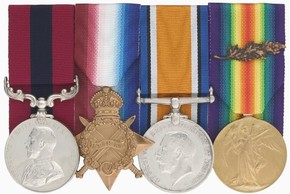
KIRBY, Horace
| Service Number: | 102 |
|---|---|
| Enlisted: | 17 August 1914, An original of A Company |
| Last Rank: | Company Quartermaster Sergeant |
| Last Unit: | 6th Infantry Battalion |
| Born: | Kew, Victoria, Australia, 6 March 1896 |
| Home Town: | Kew, Boroondara, Victoria |
| Schooling: | Not yet discovered |
| Occupation: | Labourer |
| Died: | Killed in Action, France, 23 August 1918, aged 22 years |
| Cemetery: |
Cerisy-Gailly Military Cemetery Plot II, row A, Grave No. 21. |
| Memorials: | Australian War Memorial Roll of Honour, Kew War Memorial |
World War 1 Service
| 17 Aug 1914: | Enlisted AIF WW1, Private, 102, 6th Infantry Battalion, An original of A Company | |
|---|---|---|
| 19 Oct 1914: | Involvement Private, 102, 6th Infantry Battalion, --- :embarkation_roll: roll_number: '8' embarkation_place: Melbourne embarkation_ship: HMAT Hororata embarkation_ship_number: A20 public_note: '' | |
| 19 Oct 1914: | Embarked Private, 102, 6th Infantry Battalion, HMAT Hororata, Melbourne | |
| 9 Nov 1915: | Promoted AIF WW1, Lance Corporal, 6th Infantry Battalion | |
| 15 Jan 1916: | Promoted AIF WW1, Corporal, 6th Infantry Battalion | |
| 25 Jan 1917: | Promoted AIF WW1, Sergeant, 6th Infantry Battalion | |
| 26 Jan 1917: | Promoted AIF WW1, Company Quartermaster Sergeant, 6th Infantry Battalion | |
| 23 Aug 1918: | Involvement 102, 6th Infantry Battalion, --- :awm_ww1_roll_of_honour_import: awm_service_number: 102 awm_unit: 6th Australian Infantry Battalion awm_rank: Company Quartermaster Sergeant awm_died_date: 1918-08-23 |
Help us honour Horace Kirby's service by contributing information, stories, and images so that they can be preserved for future generations.
Add my storyBiography contributed by Stephen Brooks
Horace was an original member of the 6th Battalion, being one of the first Australians to enlist during August 1914, at 19 years of age.
He was wounded in action at the landing on Gallipoli, on that very first day 25 April 1915. He wrote a letter home which was printed in the Camberwell and Hawthorn Advertiser, entitled TIDINGS FROM A KEW SOLDIER.
A letter received last week from Private Horace Kirby to his parents in Kew refers to the Australians' charge at Gallipoli. He states: 'I went into the firing line early in the morning, and was wounded at three o'clock in the afternoon — a hit in the muscle above the left knee and another in the right foot below the ankle. You need not worry, as they are getting on fine. We have English nurses, and they are very kind. It was a great relief to get off the boat, and into clean clothes, and then into sheets. The worst cases were taken off at Alexandria. There were three Kew boys on the boat. I am the only Kew boy at Valetta hospital so far. When we were being brought from the wharf to the hospital the drivers had a job to get through the crowd of people. There were police every few yards, and we had chocolates and cigarettes thrown to us. We have plenty of visitors every day, and most of them bring something — fruit, cigarettes or books— which are very acceptable. The people amuse us. When we tell them we are Australians they look surprised, and say they thought the Australians were black and very un-civilised people, but when they see us, we are the best fellows out. They are very kind in lending their motor cars, so that we can get out a bit. Letters are a thing of the past to us, but when we get them, we will have something to keep us busy for a while. We get good food and I eat and sleep well. You must cheer up and don't worry, as all will be right when we get to Constantinople, and it won't be long, but I hope to be back in time to get a bite of my own back. We did not get a fair go the first time, as they were firing on us as we landed, but God help them when the lads get settled, and get that bayonet going. The Turks won't stand to us with that. As soon as our men got out of the boats, and fixed bayonets, they got for their lives; and they had their artillery and all, and we didn't the first day.'
He was awarded the Distinguished Conduct Medal ‘for conspicuous gallantry and skilful leadership at Lihons, 10 August, 1918. He led forward a party of three, and under heavy fire, bombed two machine gun posts, capturing the guns, killing seven German gunners and establishing his party in the position. Later, when all the officers became casualties, he handled the company with great success.’
Less than two weeks later he was killed in action, having been in the AIF for over four years. He had two brothers who served in the AIF, both returned, one wounded.










